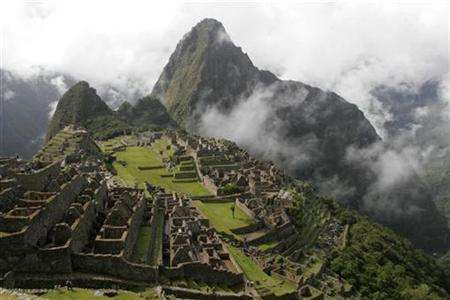Peru-Yale Machu Picchu Controversy Part 6
posted on May 12th, 2008 in Andes Mountains, Archaeology, Incas, Machu Picchu, Peru, Peru-Yale Controversy
The Lost Treasure of Machu Picchu
By ELIANE KARP-TOLEDO
February 23, 2008
Op-Ed Contributor
NYT
Stanford, Calif.
Sure, it seemed like a great idea when, last September, President Alan García of Peru reached a preliminary agreement with Yale about the disposition of more than 350 artifacts taken from Machu Picchu. Everyone hoped the settlement might be a break for cultural understanding in the cloudy skies of international cooperation. News reports suggested that Yale would return more than 350 museum-quality artifacts, plus several thousand fragments thought to be of interest mainly to researchers — all of which were taken from the mountaintop Inca archaeological complex nearly a century ago — and that legal title to all the artifacts, even those to be left at Yale for research, would be held by Peru.
But having finally obtained a copy of the agreement, I can see that Yale continues to deny Peru the right to its cultural patrimony, something Peru has demanded since 1920.
When, in 1912 and 1914-15, the explorer Hiram Bingham III excavated the treasures from Machu Picchu — ceramic vessels, silver statues, jewelry and human bones — and took them from Peru, it was supposed to be a loan for 12 months (a period that was later extended a half-year). The National Geographic Society, which co-sponsored Bingham’s explorations, has acknowledged that the artifacts were taken on loan and is committed to seeing them returned to Peru…
From 2001 to 2006, when my husband, Alejandro Toledo, was president of Peru, I participated in negotiations with Yale over the artifacts. Peru requested the return of everything Bingham had removed from Machu Picchu, and President Toledo, with the support of both the National Geographic Society and Senator Christopher Dodd, of Connecticut, discussed the request directly with the president of Yale, Richard C. Levin. Those talks broke down, however, when Yale refused to accept our first condition: recognition that Peru is the sole owner of the artifacts. The university also would not allow us to conduct an inventory of the pieces, under the pretext that the archaeologist we had selected was not qualified.
The Peruvian ambassador in Washington tried to revive the conversation with Yale, but by early 2006, it was clear that the university was stalling for time. President Toledo left office in July 2006, and a little over a year later, the latest agreement was announced. Fortunately, a final agreement has been delayed.
Under the “memorandum of understanding” between Yale and President García, Peru would promise to build a museum and research center in Cuzco, the city closest to Machu Picchu, where some of the collection would be displayed. Yale would act as adviser for the center, and would also be allowed to select which pieces would be released to the museum. Peru’s sovereign right to the entire collection is not acknowledged, and it is clear that Yale would keep a significant proportion of the materials. Peru would still not be allowed to conduct its own inventory. Only when a museum has been built to Yale’s specifications would even a portion of the materials return, allowing Peruvians to enjoy artifacts they have never seen.
I fail to understand the rationale for Yale to have any historical claim to the artifacts. Bingham had no authority to transfer ownership to begin with. The agreement reflects a colonial way of thinking not expected from a modern academic institution. In fact, Yale has gone a step further than it did in its negotiations with President Toledo; the university is now brazenly asking to keep a significant part of the collection for research for an additional 99 years.
I wonder if it is pure coincidence that Yale delayed negotiations with Mr. Toledo, Peru’s first elected indigenous president, until Peru had a new leader who is frankly hostile to indigenous matters.
Why is it so hard for Yale to let go of these collections after almost a century of loan default? It is time for Peruvian scholars and citizens — especially the indigenous descendants of those who led Bingham to the ancient complex — to have access to the collection. The present agreement should be discarded and new talks should begin, based on the recognition of Peru’s sovereign right to all that was taken from Machu Picchu. Yale must finally return the artifacts that symbolize Peru’s great heritage.
Eliane Karp-Toledo, the former first lady of Peru, is a visiting lecturer at Stanford.

